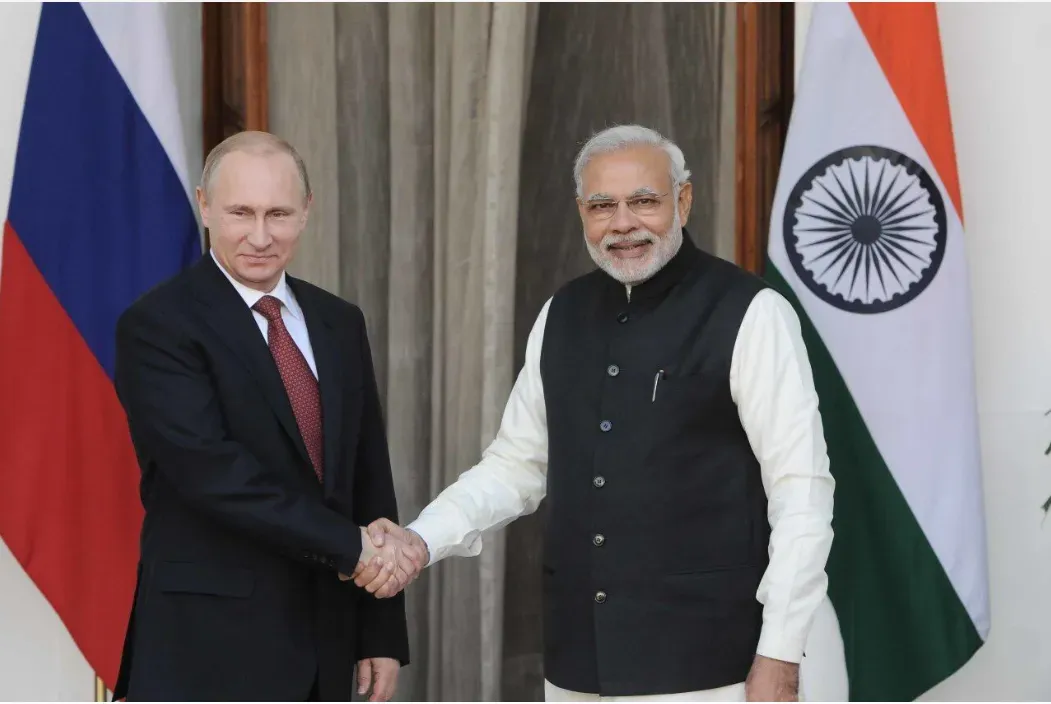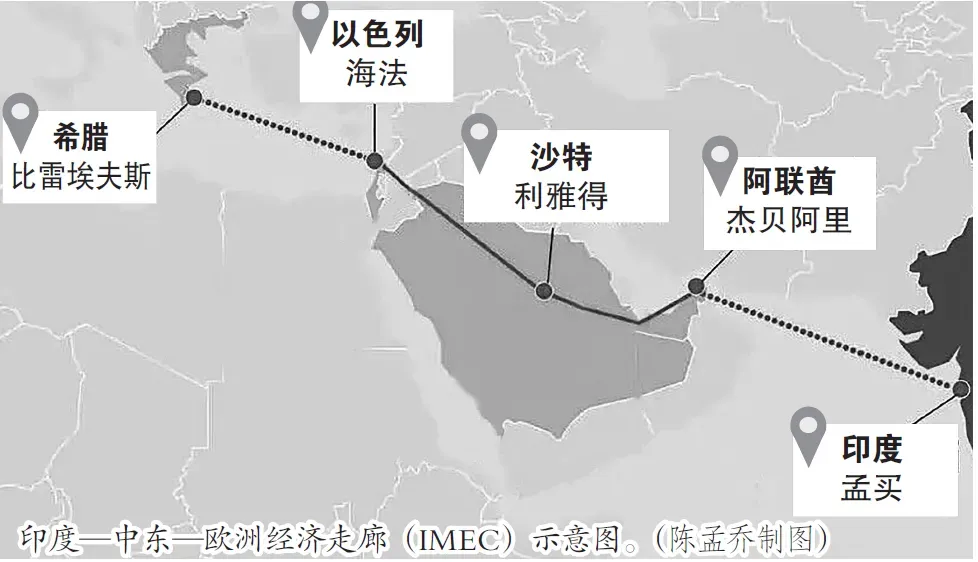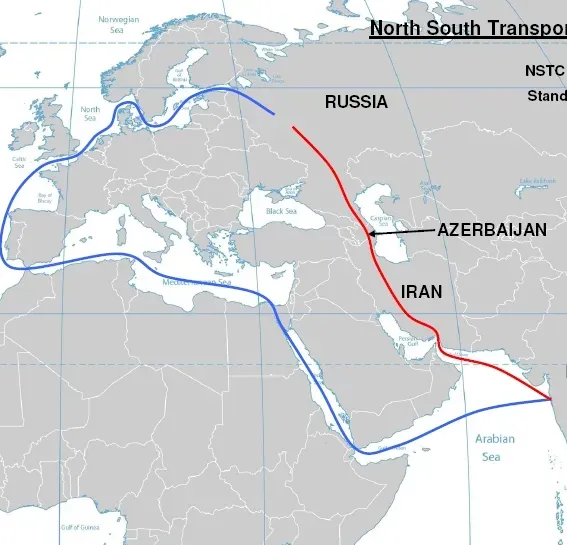Modi visits Russia:Behind the repair of India-Russia relations and the game between the United States and India
2024 年 7 月 9 日晚间,莫斯科新奥加廖沃的总统官邸里,迎来了一位久违的客人:印度总理莫迪。 之所以说久违,因为在 2019 年后的五年里,莫迪都没有访问过俄罗斯,印俄关系曾经很紧密,但莫迪连续五年没有到访,不得不让外界产生疑问,两国关系是否出现了裂痕? 特别是俄乌开战后的 2022 年 9 月上合组织撒马尔罕峰会上,莫迪委婉地批评了普京,于是一时间,有关“印俄关系生变”的说法,不绝于耳。 西方,尤其是美国,便加紧了拉拢印度的步伐,又是给糖,又是给枣。 为了巩固印俄关系, 2024 年 3 月,普京向莫迪发出了访问邀请,莫迪犹豫了好几个月,终于在 7 月正式成行,而且是他第三个任期开始后的首访。 按照外交惯例,首访对象是最受重视的,莫迪此举给足了普京面子,值得注意的是,莫迪的访问时间是 7 月 8 日和 9 日,而北约峰会的时间是 9 日到 11 日。 也就是说,两者的时间存在重叠,莫迪的访问,多少有点给美国上眼药的意思。 当 7 月 8 日晚间,莫迪出现在新奥加廖沃的总统官邸门前时,普京长舒了一口气,他紧紧握住莫迪的手,两人当晚相谈甚欢,为期两天的访问,达成了双边货币合作机制、推进经贸等一系列成果。  印俄关系的下滑态势,被止住了。有人欢,就一定有人愁。 美国驻印度大使加塞蒂表示:“我尊重印度的战略自主。不过在冲突时期,不存在战略自主的说法。” 印度的战略自主只是水面上的原因,水面下潜藏着的,是美印两国一系列的明争暗斗。 壹 2023 年 6 月 20 日 -24 日,莫迪访问美国,美国直接给了莫迪极高的待遇,有多高呢? 首先是以国事访问的待遇接待莫迪。 国事访问是元首才能享受的,而印度名义上的元首是总统,作为总理的莫迪,理论上不能享受“国事访问”的待遇,总理在外交上的接待规格,通常是“应邀访问”。 但美国为了拉拢莫迪,还是给了。 其次,是安排莫迪在美国国会发表演讲。 外国元首在美国国会演讲这个待遇,通常只有美国的亲密盟友才能得到,印度并不是美国的亲密盟友,以前从来没有得到过。 但他这次却得到了,可见面子给足了。 最重要的是,两国发表了《联合声明》,声明的内容涵盖了半导体、造船、航空航天、教育、生物医药、军工技术等多个领域的合作,许多都不是虚的,是真材实料的合作,力度在印美关系历史上前所未有。 之所以拜登会如此重视莫迪,除了联合对付中国外,也和大环境有关。 2023 年 6 月,世界上最重要的事情,无疑是乌军的扎波罗热反攻,反攻的成败将决定历史走向,所以印度是必须拉拢的,无论是多给一点银子,还是多给一点面子,都值得。 按理说,接下来印美双方的关系会更上一层楼,合作会更加密切。但事实恰恰相反,从 2024 年起,美国和印度的关系,竟然出现了不小的降温。 最明显的就是, 2024 年 1 月,拜登宣布不会出席印度的“共和国日”活动,理由是大选年,竞选活动繁多,没空。 每年的 1 月 26 日,是印度的“共和国日”,相当于我们的国庆节,印度传统上会邀请他国元首来观看阅兵,并进行外交活动,法国好几任总统都出席过。 对于 2024 年的“共和国日”,印度准备很充足,准备邀请拜登、岸田文雄还有澳大利亚总理一起来,顺便把四国峰会( QUAD )给办了。 结果拜登不去,其他国家元首觉得去了也没啥用,自然四国峰会就没开成。 然而,拜登不去真的是因为竞选事务繁忙吗?当然不是,区区两场竞选活动,怎么可能比四国峰会更重要,怎么可能比拉拢印度更重要。 这就是随便找的借口。 更扎心的是,美国一边放印度的鸽子,一边拉了一个新群 -- “美日菲澳”,也就是新四国机制。 今年 5 月,美日菲澳的国防部长在夏威夷举行会议,标志着新四国机制的初步成型。 不是有一个四国机制了吗,干嘛又拉一个,如果菲律宾想进群的话,那把四国机制扩编成五国,不就完了吗,理论上没必要另建新群。 毕竟建新群的工作量,比老群加个人要麻烦多了。 而且另建新群意味着要投入新的资源,老的“四国机制”会被弱化,印度会一定程度上被边缘化。这些事情,都不利于美国拉拢印度,更像是美国在敲打印度。 其实这一切的背后,是源于 2023 年下半年发生的两件事。
印俄关系的下滑态势,被止住了。有人欢,就一定有人愁。 美国驻印度大使加塞蒂表示:“我尊重印度的战略自主。不过在冲突时期,不存在战略自主的说法。” 印度的战略自主只是水面上的原因,水面下潜藏着的,是美印两国一系列的明争暗斗。 壹 2023 年 6 月 20 日 -24 日,莫迪访问美国,美国直接给了莫迪极高的待遇,有多高呢? 首先是以国事访问的待遇接待莫迪。 国事访问是元首才能享受的,而印度名义上的元首是总统,作为总理的莫迪,理论上不能享受“国事访问”的待遇,总理在外交上的接待规格,通常是“应邀访问”。 但美国为了拉拢莫迪,还是给了。 其次,是安排莫迪在美国国会发表演讲。 外国元首在美国国会演讲这个待遇,通常只有美国的亲密盟友才能得到,印度并不是美国的亲密盟友,以前从来没有得到过。 但他这次却得到了,可见面子给足了。 最重要的是,两国发表了《联合声明》,声明的内容涵盖了半导体、造船、航空航天、教育、生物医药、军工技术等多个领域的合作,许多都不是虚的,是真材实料的合作,力度在印美关系历史上前所未有。 之所以拜登会如此重视莫迪,除了联合对付中国外,也和大环境有关。 2023 年 6 月,世界上最重要的事情,无疑是乌军的扎波罗热反攻,反攻的成败将决定历史走向,所以印度是必须拉拢的,无论是多给一点银子,还是多给一点面子,都值得。 按理说,接下来印美双方的关系会更上一层楼,合作会更加密切。但事实恰恰相反,从 2024 年起,美国和印度的关系,竟然出现了不小的降温。 最明显的就是, 2024 年 1 月,拜登宣布不会出席印度的“共和国日”活动,理由是大选年,竞选活动繁多,没空。 每年的 1 月 26 日,是印度的“共和国日”,相当于我们的国庆节,印度传统上会邀请他国元首来观看阅兵,并进行外交活动,法国好几任总统都出席过。 对于 2024 年的“共和国日”,印度准备很充足,准备邀请拜登、岸田文雄还有澳大利亚总理一起来,顺便把四国峰会( QUAD )给办了。 结果拜登不去,其他国家元首觉得去了也没啥用,自然四国峰会就没开成。 然而,拜登不去真的是因为竞选事务繁忙吗?当然不是,区区两场竞选活动,怎么可能比四国峰会更重要,怎么可能比拉拢印度更重要。 这就是随便找的借口。 更扎心的是,美国一边放印度的鸽子,一边拉了一个新群 -- “美日菲澳”,也就是新四国机制。 今年 5 月,美日菲澳的国防部长在夏威夷举行会议,标志着新四国机制的初步成型。 不是有一个四国机制了吗,干嘛又拉一个,如果菲律宾想进群的话,那把四国机制扩编成五国,不就完了吗,理论上没必要另建新群。 毕竟建新群的工作量,比老群加个人要麻烦多了。 而且另建新群意味着要投入新的资源,老的“四国机制”会被弱化,印度会一定程度上被边缘化。这些事情,都不利于美国拉拢印度,更像是美国在敲打印度。 其实这一切的背后,是源于 2023 年下半年发生的两件事。
贰 第一件事,是 2023 年 9 月 9 日到 10 日,在印度新德里举行的 G20 峰会。 对于这次峰会,莫迪不可谓不上心,不光要在全国举办 200 多场与 G20 有关的会议,还专门拨了上百亿卢比的预算,在新德里搞清洁,多达 30 万贫民窟的人被赶走。 那些赶不走的,就用东西挡住,防止外宾们看到。 美国也对这次峰会期待很高,因为 2022 年在印尼举行的 G20 峰会,联合声明里对俄罗斯进行了不点名批评,被西方视为重大胜利。 于是在 2023 年的新德里 G20 峰会上,自然要再接再厉,把不点名批评变成“点名批评”, 3 个月前莫迪访问美国时,美国给了那么多,为的就是今天。 只要在联合声明里点名批评,就等于印度纳了投名状。 为了让莫迪同意,美国又给了两颗甜枣,一是再次发表《印美联合声明》,内容和 3 个月前的那一份大同小异,意思是放心吧老仙,我不会食言,说给你的一定给。 二是启动了“印欧经济走廊”项目。 “印欧经济走廊”就是从孟买,到阿联酋和沙特,再到希腊南部的一条商路。 印度商品要卖到欧洲,要么走红海,要么走好望角,如果这个项目能成,就可以直通欧洲,对印度经济大有帮助。  给了这么多,印度总该给点回报吧? 然而事实是,莫迪的表现令美国大失所望。他始终不同意批评俄罗斯,事后发表的联合声明里,别说点名批评,连不点名批评都没有。 措辞的严厉程度,明显不如 2022 年的 G20 联合声明,声明发出后,俄罗斯就松了一口气。 但拜登就不爽了,合着花了那么多钱没用是吧,所以 G20 的最后一场会议拜登也不参加了,直接去了越南。 第二件事,是 2023 年 12 月,印度外交部长苏杰生对俄罗斯进行了访问,普京、拉夫罗夫和工贸部长曼图罗夫先后接见了苏杰生。 在苏杰生访俄前的整个 2023 年,除了拉夫罗夫因出席 G20 而到访印度外,印俄双方再无别的高层互访。 苏杰生的到来,表明印度在看到乌军没有获胜希望后,试图重新巩固印俄关系,双方的合作内容里有一条“启动国际南北运输走廊”。 “国际南北运输走廊”从印度西部的孟买出发,经海上进入伊朗,再进入高加索到达俄罗斯,再进入欧洲,旨在加强印度和俄罗斯以及欧洲的联系。 有点印度版“一带一路”的意思。
给了这么多,印度总该给点回报吧? 然而事实是,莫迪的表现令美国大失所望。他始终不同意批评俄罗斯,事后发表的联合声明里,别说点名批评,连不点名批评都没有。 措辞的严厉程度,明显不如 2022 年的 G20 联合声明,声明发出后,俄罗斯就松了一口气。 但拜登就不爽了,合着花了那么多钱没用是吧,所以 G20 的最后一场会议拜登也不参加了,直接去了越南。 第二件事,是 2023 年 12 月,印度外交部长苏杰生对俄罗斯进行了访问,普京、拉夫罗夫和工贸部长曼图罗夫先后接见了苏杰生。 在苏杰生访俄前的整个 2023 年,除了拉夫罗夫因出席 G20 而到访印度外,印俄双方再无别的高层互访。 苏杰生的到来,表明印度在看到乌军没有获胜希望后,试图重新巩固印俄关系,双方的合作内容里有一条“启动国际南北运输走廊”。 “国际南北运输走廊”从印度西部的孟买出发,经海上进入伊朗,再进入高加索到达俄罗斯,再进入欧洲,旨在加强印度和俄罗斯以及欧洲的联系。 有点印度版“一带一路”的意思。  看地图就会发现,“国际南北运输走廊”有个必经之地——伊朗的恰巴哈尔港。 没有伊朗的支持,线路必然失败,这就决定了印度必须和伊朗搞好关系。 今年 5 月 13 日,伊朗与印度签署了为期 10 年的恰巴哈尔港合作协议,印度将向港口投资 3.7 亿美元,推动“国际南北运输走廊”的落地。 要知道,莫迪政府在新一轮巴以冲突中的立场,是站以色列的,“印欧经济走廊”计划,理论上就能加强印度与以色列的利益联系。 但这边却又是和伊朗加强联系,又是和俄罗斯加强联系,试问美国会怎么想? 合着投名状你是一个都不纳,好处还全都要呗。 站在美国的立场,“印欧经济走廊”和“国际南北运输走廊”,你只能二选一。 可是站在莫迪的立场,扎波罗热反攻都失败了,俄罗斯不会输,我继续两头捞好处不香吗,干嘛非要站队。而且说实在的,美国给得实在太少了。 这是怎么回事呢? 2023 年 6 月的《美印联合声明》虽然字数很多,但大部分合作内容要么是意向性的,要么是长期性。 短期内能让印度受益的,只有美光在印度投资 4.85 亿美元、美国允许军舰在印度维修、通用电气在印度生产(实际上是组装) F-414 涡扇发动机等区区几项。 这些东西的确是真金白银,不过别忘了,印度的体量很大,胃口也就很大。光凭这几个项目就想让印度纳投名状,站到俄罗斯对立面? 普京可是我的挚爱亲朋,手足兄弟呀,得加钱。 那么,拜登加钱了吗? 2023 年 6 月的《印美联合声明》,和 2023 年 9 月的联合声明,还有 2024 年 6 月沙利文访印后发表的那一份,三者的内容基本大同小异。 相比第一份,后面两份的确增加了一些东西,只是不多。换句话说,加钱了,但没加多少。这也是今年 7 月,莫迪要访问俄罗斯,修复两国关系的原因。 既然不愿意加钱,那就来点刺激的。 只不过,美国不愿意加钱,不光是印度坚持战略自主,还有着深层次的顾虑。 叁
看地图就会发现,“国际南北运输走廊”有个必经之地——伊朗的恰巴哈尔港。 没有伊朗的支持,线路必然失败,这就决定了印度必须和伊朗搞好关系。 今年 5 月 13 日,伊朗与印度签署了为期 10 年的恰巴哈尔港合作协议,印度将向港口投资 3.7 亿美元,推动“国际南北运输走廊”的落地。 要知道,莫迪政府在新一轮巴以冲突中的立场,是站以色列的,“印欧经济走廊”计划,理论上就能加强印度与以色列的利益联系。 但这边却又是和伊朗加强联系,又是和俄罗斯加强联系,试问美国会怎么想? 合着投名状你是一个都不纳,好处还全都要呗。 站在美国的立场,“印欧经济走廊”和“国际南北运输走廊”,你只能二选一。 可是站在莫迪的立场,扎波罗热反攻都失败了,俄罗斯不会输,我继续两头捞好处不香吗,干嘛非要站队。而且说实在的,美国给得实在太少了。 这是怎么回事呢? 2023 年 6 月的《美印联合声明》虽然字数很多,但大部分合作内容要么是意向性的,要么是长期性。 短期内能让印度受益的,只有美光在印度投资 4.85 亿美元、美国允许军舰在印度维修、通用电气在印度生产(实际上是组装) F-414 涡扇发动机等区区几项。 这些东西的确是真金白银,不过别忘了,印度的体量很大,胃口也就很大。光凭这几个项目就想让印度纳投名状,站到俄罗斯对立面? 普京可是我的挚爱亲朋,手足兄弟呀,得加钱。 那么,拜登加钱了吗? 2023 年 6 月的《印美联合声明》,和 2023 年 9 月的联合声明,还有 2024 年 6 月沙利文访印后发表的那一份,三者的内容基本大同小异。 相比第一份,后面两份的确增加了一些东西,只是不多。换句话说,加钱了,但没加多少。这也是今年 7 月,莫迪要访问俄罗斯,修复两国关系的原因。 既然不愿意加钱,那就来点刺激的。 只不过,美国不愿意加钱,不光是印度坚持战略自主,还有着深层次的顾虑。 叁
If you want to spend a lot of money on a person, you have to at least make sure that he is one of his own, international politics is the same, if you want to spend a lot of money on another country, you have to make sure that the country is in your own camp and under control. Otherwise, you will think that the money will be wasted. To put it bluntly, to bring a country into its own camp should be under its own control. To put it bluntly, it is much more relieved to infiltrate, train "agents" and then support these "agents". This is why the United States always requires countries to unilaterally open up to it, because only when it is open, it is convenient to infiltrate, and it is even more difficult to train agents if it is not open. Only when it infiltrates and trains a sufficient number of agents will it rest assured that it will open more markets and deliver more resources to you. In a way, this is a microcosm of our decades-long relationship with the United States. Although we know that there are great negative effects, in order to develop the economy, keep the decoupling and tear the face, the only way is to limit this kind of infiltration to a certain range. Similarly, if India wants the United States to increase money and fully open its markets, it is necessary to allow the United States to infiltrate and allow the United States to train agents within itself. But India just won't allow it. I am in ["poor results in the election, Modi is in trouble? It is said in the article that Modi's "de-Englishization" in education and native language teaching is tantamount to gradually leaving the English-speaking world, which is seriously disadvantageous to the infiltration of the United States. But Mr Modi's measures do not stop there. There are also two policies to combat Western infiltration, which are rarely mentioned at home, but they are very important. After Modi came to power in 2014, with his continuous promotion, most Indian states passed the "anti-democracy law". The content of the bill is very simple, people of other religions can convert to Hinduism, while Hindus are not allowed to convert to other religions. The outside world's view of "opposing the rule of law" is often regarded as attacking Muslims, but they do not realize that Christianity is also the target of attack. For example, in May 2023, the ethnic conflict in Manipur was between the Hindu Meitai and the Christian Kuki, which killed hundreds of people and caused tens of thousands to flee their homes. The Bharatiya Janata Party's strategy in Manipur has long been to win over the Mehtai, the majority of the population, and to crack down on the Kuki and Naga, the minority. So after the conflict, Modi only said a few salty words, in fact, to encourage the Meitai people, you give a little more strength. Christianity has always been the vanguard of the infiltration of the West, especially the United States, in all parts of the world. If you want to become an agent of the United States, and if you want to win the trust and support of the United States, baptism is the basic application. The most typical is Lao Jiang. When Lao Chiang married Soong Mei-ling, he not only liked the wealth of the Song family, but also saw the Song family as an American agent, and the Song family was a Christian and the financier of the Christian church at that time, so Lao Chiang wanted to marry Soong Mei-ling, and the hard condition put forward by the Song family was to abandon Buddha and convert to Jesus. After weighing the pros and cons, Lao Jiang chose to agree. It is no accident that not only old Chiang Kai-shek, but also many American agents in China today are Christians, and Modi's policy of cracking down on Christianity is seriously detrimental to American infiltration. Over the past decade, under Modi's heavy punch, Christianity has obviously declined in India. Take members of Parliament as an example. In the past, the Indian Parliament usually had one or two Christian members, but today's Indian Parliament no longer has a Christian member. In addition to Christianity, another focus of Modi's attack is NGO. We know that it is normal for the West to use NGO to infiltrate, and the same is true for India. There are about 25000 NGO in India that accept donations from the West, and Modi has long been unhappy with them. Shortly after taking office, Modi blacklisted the infamous NGO "Ford Foundation", which is familiar to everyone, a NGO with close ties to CIA. Often, where there is the Yan GE, there is the "Ford Foundation". For example, in July this year, there was a large-scale riot in Kenya, demanding that President Ruto step down. Ruto directly named the "Ford Foundation" to incite the riots. The United States must be dissatisfied that such an important white glove was blackened, but it was only an appetizer, and Modi served the main course after the outbreak. In January 2020, the Government of India amended the Foreign donation Registration Act (abbreviated as "Foreign donation Registration Act").: FCRA), revised as follows: (1) NGOs that receive overseas funding must first register before they can operate;(2) They must open an account with a bank designated by the Indian government so that the government can supervise the flow;(3) The money and materials of one NGO cannot be given to another NGO and can only be used by themselves;(4) Administrative expenses must not exceed 20% of the total expenses. The first and fourth articles actually have little impact. The key is the second and third articles, which almost cost the lives of many Western NGOs. If the Indian government knows about this, how can it do black work? In 2022, more than 6,000 NGOs failed to meet the standards and were immediately terminated by the Indian government. Interestingly, many of these NGOs whose qualifications were terminated had connections to Christianity. For example, the Indian branch of Oxfam still has 65 million yuan in its account, but it has been frozen by the Indian government and cannot be taken out. "De-Anglicization" in education, religious crackdowns on Christians, and strict restrictions on the penetration of Western NGOs show that the Indian government under Modi is unwilling to open its ideology to the United States and will not accept penetration. In this way, it will be difficult for the United States to cultivate enough interest agents within India and bring India under control. It will only give some small money, but not big money. Because in this case, even if a lot of money is given, a large probability will be wasted. 4 If King Understanding comes back, will there be changes in India-US relations? The king does not care about ideology or the relationship between India and Russia, which is a positive factor for India-US relations. However, there are two points that cannot be avoided. One is that we understand that the king wants to let industries return, while India wants to transfer industries, which has obvious conflicts of interests; the second is that the "International North-South Transport Corridor" will not stop, and the strengthening of relations between India and Iran will inevitably cause dissatisfaction with the United States. The international game is very complex. Many times, there is no absolute person who leans against whom. Even allies of the United States have a basket of contradictions with the United States, let alone India. Opponents are never monolithic, and there are contradictions that can be exploited. At the same time, India's complex existence is of great inspiration to the world. To put it bluntly, India provides a case:When the United States pulls you in to do something and really benefits you, it's best for you to never do it, or even step up your efforts to do something it doesn't want to see. There is now a trend towards global right-wing and global nationalization. This may not be a good thing, but it may not be a bad thing. Nationalism is a double-edged sword. In the global game, people are increasingly considering their own national interests first. Under such circumstances, whether they have such strength or not, many countries will have an unprecedented level of self-awareness, and India is a typical example. Such a country will not easily obey anyone, not even the United States. This approach of emphasizing national interests will give us a lot of room for operation. As long as we play our cards properly, the so-called "Indo-Pacific Strategy" will not be so easy to succeed.
